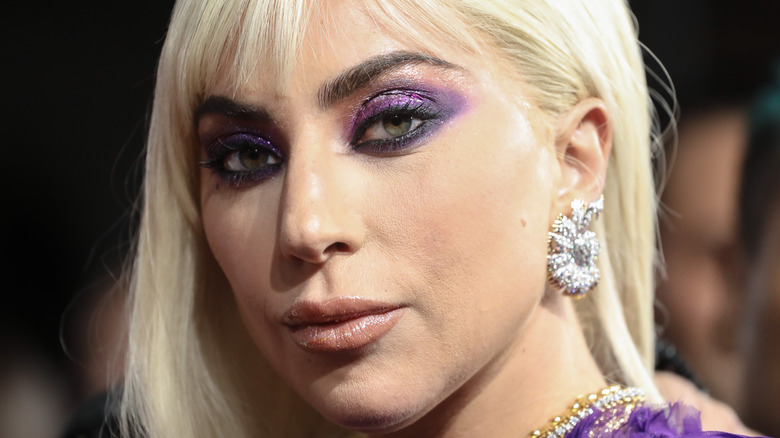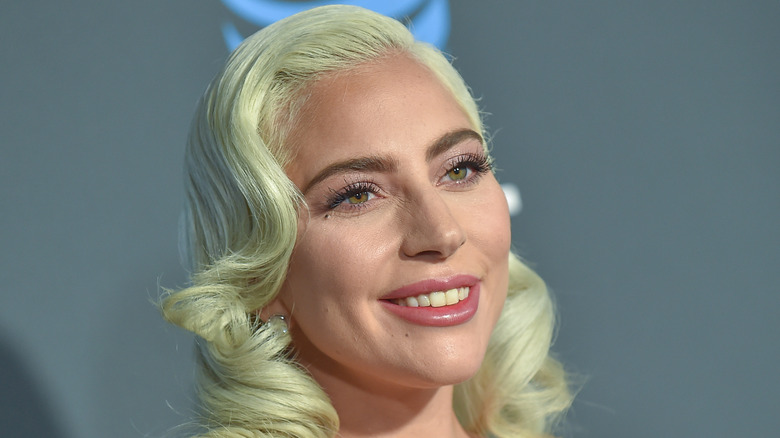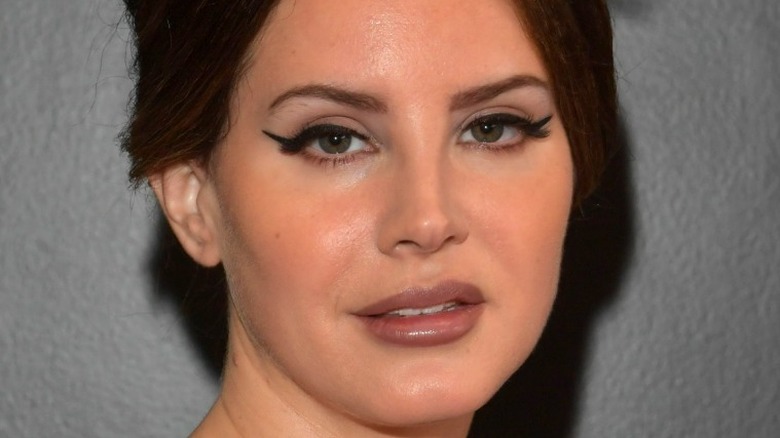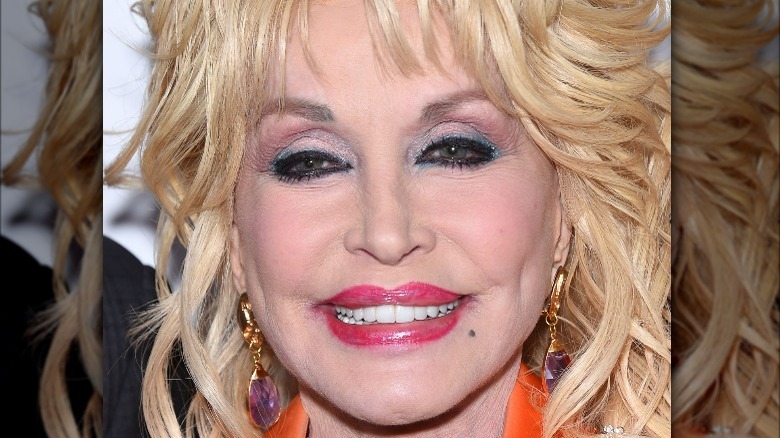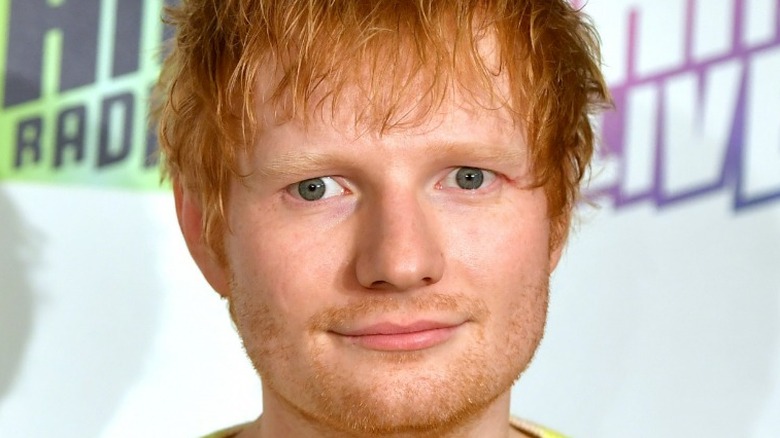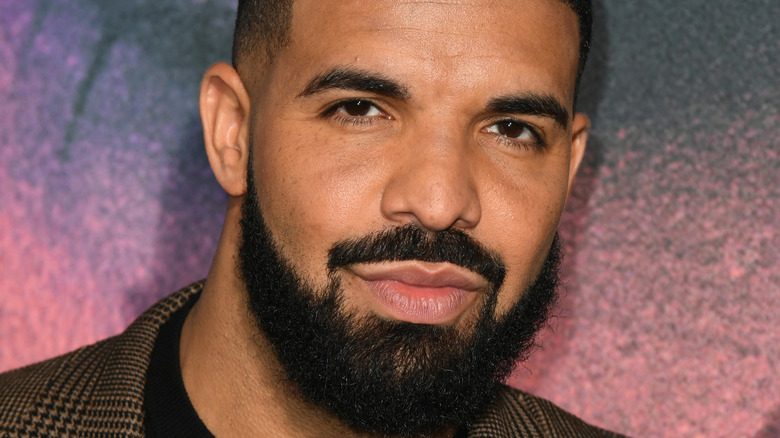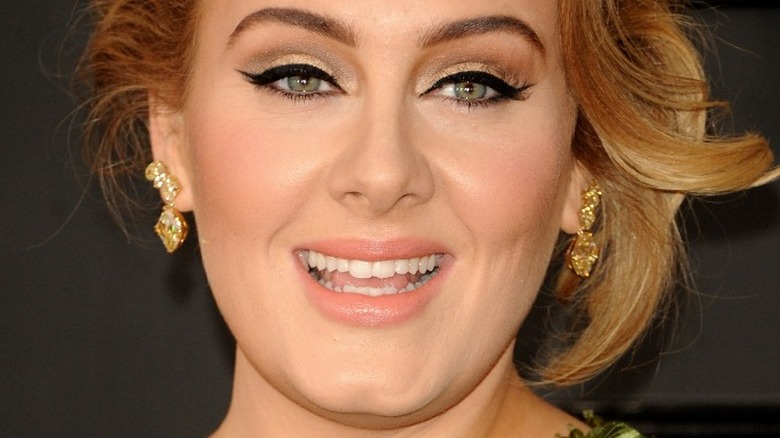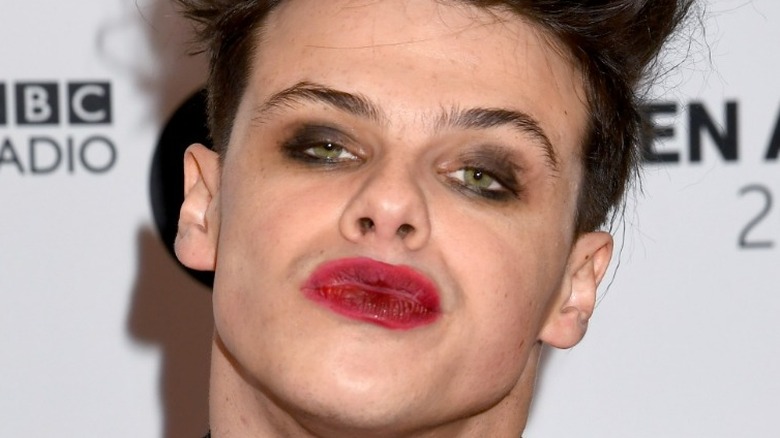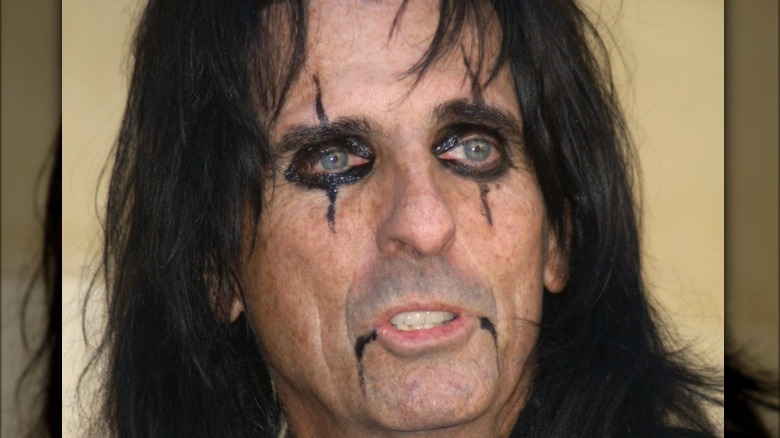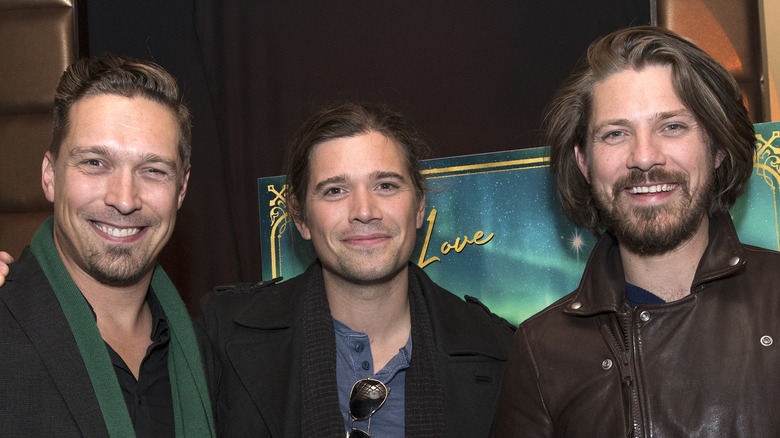Musicians That Are Nothing Like They Seem
The following article includes references to depression and addiction.
In an industry full of artifice and spin, it's not much of a surprise to discover there are plenty of musicians that are nothing like they seem. For a lot of artists, creating a stage persona grants them freedom to perform on a different level and to create safe boundaries between their work and their personal life. For others, it's simply easier to cut a profit if people don't know the reality of their life and identity.
There's a rich history, after all, of musicians not being quite who they present themselves as. The White Stripes once presented as siblings, but were actually a married couple. Milli Vanilli never sang a single word of their smash hit, "Girl You Know It's True." And Kanye West and Taylor Swift's one-time attempt at friendship seemed dubious at best.
It's the oldest song in the book, and yet it's one that so many fans willfully listen to and fall for. Nobody wants to believe they're being deceived on some level, and in an age where authenticity and honesty are integral to an artist's success, many musicians might have faked it to make it. So get ready to throw on your superstar costume, scrub your social media, and lip sync for your life, because these are musicians who are nothing like they seem.
Is Lady Gaga's authentic persona still an act?
Back in 2009, before fans gifted her the Mother Monster mantle, Lady Gaga took the effort to assure Rolling Stone that every last inch of her performance in the public eye was authentic, not contrived. "The largest misconception is that Lady Gaga is a persona or a character," she said. "I'm not. ... I am 150,000 percent Lady Gaga every day." However, as her career evolved, Gaga appeared like an art-pop Matryoshka doll, shedding her couture costume layers to reveal Stefani Germanotta, the diminutive artist at the center.
Be it crooning duets with Tony Bennett, hustling for that Oscar on the promotional trail for "A Star is Born," or insisting she "never broke" her "House of Gucci" character for the nine months of filming, Gaga had seemingly dropped the act to go legit. Or had she? In 2019, Spencer Kornhaber of The Atlantic argued that "the persona isn't gone," and that instead, "the showtunes-singing Italian American family girl we see in latter-day Gaga projects is a performance, too."
Certainly, Gaga has suggested as much in interviews. Speaking to Digital Spy, she once described the image she projects to the public as being "a show with no intermission," meanwhile in a Variety interview with Jaime Lee Curtis, Gaga described herself as an "amalgamation of Stefani" — an artistic spezzatino of reality and creation. Ever-shifting and inscrutable, Gaga may remain an optical illusion of celebrity for as long as she remains in the public eye.
Lana Del Rey may be a character
Like Lady Gaga, Lana Del Rey has likewise been subjected to accusations of existing within a carefully crafted persona. In 2012, the artist formerly known as Lizzy Grant first garnered controversy when leaked footage of the star's shy, organic earlier work stood in stark contrast to the laconic, Lynchian sex-kitten of "Video Games." As reported by The Guardian, Del Rey was promoted as "an underground sensation" who seemingly arrived out of nowhere. When it transpired that she was actually "the daughter of a millionaire father who ... backed her career," people felt like "victims of an immense confidence trick."
Over the years, the star has continued to push a persona of authenticity. Her music can feature painfully confessional elements — or at the very least, they're presented that way. But as Ann Powers argued in her NPR essay about the star's 2019 album "Norman F****** Rockwell," Del Rey's musical storytelling seemingly stems from "her compulsion to collapse logic" via her "persona as a bad girl to whom bad things are done." The musician's persona, Powers suggested, is much like her music: A fiction composed with the help of collaborators.
Outraged, Del Rey slammed Powers' observations in a Twitter rant where she insisted, "Never had a persona. Never needed one. Never will" (via Pop Dust). But this might be a tough sell when the woman, who's worth an estimated $30 million, went on to wear a dress rumored to cost $18 on the red carpet in 2021 (via Page Six Style).
Machine Gun Kelly isn't always as tough as he acts
An enigma of a different variety, Machine Gun Kelly has always liked to front as being a ferocious outcast oddball. By all accounts, he has the appearance of a tattooed tough guy who isn't afraid to diss industry heavyweights like Eminem, Conor McGregor, and Slipknot. But on the sly? Kelly is something of a softie — and that's not a bad thing.
For a starter pack of evidence, you needn't look much further than the star's adorable relationship with his daughter, Casie (via Us Weekly). Speaking to Billboard, he copped to the fact that he mellowed his "wild" side for his child, who wasn't quite ready for him to be "as gnarly" as he can be. "I wanted to make her proud, and a lot of fans saw that as soft," Kelly said. "And it's like, no, it's the most beautiful thing you could do."
Meanwhile, his public affection for partner Megan Fox has further revealed him to be a greater lover than a fighter. Sure, he wears her infamous blood necklace, but as he indicated to Nylon, their romance has helped him find calm. Fox, Kelly said, was someone who took him "out of the fast lane" and who ensures he's "safe." During a GQ interview, Fox further outed the pop-punk star as being a huge Nicole Kidman fan who loved "Big Little Lies," "Nine Perfect Strangers," and "The Undoing." Not exactly tough-guy shows.
Dolly Parton has never been a dumb blonde
For over 50 years, Dolly Parton carefully built a phenomenal career around her now iconic image: A buxom, bubbly blonde with big ... well, everything. People are often keen to make sexist assumptions that such women follow the stereotype of not being too bright — something that the country legend played up to and used to her advantage.
Speaking to Billboard in 2014, Parton explained that people would often underestimate her because of her looks. "I really looked like easy prey to a lot of guys," she said, "just looked easy, period." If they weren't paying close attention to what she was saying, Parton would warn them, "I look like a woman, but I think like a man and you better pay attention or I'll have your money and be gone." Intriguingly, the "Jolene" icon has almost always been upfront about her ruse. In 1978, she confessed to Playboy that her look was something of a fabrication. "Can you imagine anybody wanting to look this way for real?" she jokingly asked, before suggesting that once people get to know her they completely understand why she assumed the look she did. "They know it's a load of baloney," Parton explained. "But why not? Life's boring enough, it makes you try to spice it up."
To this day, Parton still proudly rocks her dollybird persona — and her jaw-dropping $350 million net worth proves that she was definitely smarter than some people assumed (via Forbes).
Was Ed Sheeran really a rags-to-riches story?
In 2014, British singer-songwriter Ed Sheeran's rags-to-riches narrative was cemented with one key anecdote from his book, "A Visual Journey." Writing about how he "didn't have anywhere to live" between 2008 and 2010, the "Bad Habits" hit-maker revealed how he'd often "sleep on Circle Line trains" between gigs, and even slept rough "outside Buckingham Palace" for a couple of nights (via the Daily Mail).
It seems this wasn't entirely the truth, though. For starters, Sheeran's parents are quite wealthy: His dad was an art curator, and his mom a culture publicist and jewelry designer, according to the Mirror, who also noted how his supportive parents shared an art consultancy firm through 2010. So, it's hard to imagine he'd struggled financially. The singer then later backpedaled to suggest his anecdotes had been "taken out of context." Speaking to Capital FM, he revealed that in reality, he wasn't homeless — rather, he "went without a bed for some nights" (via MTV News).
Sheeran admitted as much in the song "Homeless" — which he wrote while squatting outside Buckingham Palace (via the Daily Mail) — where he sings, "It's not a homeless night for me, I'm just home less than I'd like to be." Regardless, in 2021, the story resurfaced online and, according to The Things, fans were outraged to discover Sheeran's backstory wasn't quite what that they thought. In a since-deleted tweet, one fan even accused the star of "cosplaying as poor."
Drake never 'started from the bottom'
From one questionable rags-to-riches story to another. Was Drake really being sincere when he suggested that stories about him having "never struggled, wasn't hungry" weren't true in his 2013 hit "Started from the Bottom"? Some critics have had a tough time believing it to be the case. NYU Local, for instance, pointed out that "Drake did not, in fact, start from the bottom," and his privileged background might be enough proof as to why.
Explaining that the hip-hop star moved to the "upscale" Toronto neighborhood of Forest Hill when he was 11, the website argued that "nobody in Toronto would ever say that the bottom would be Forest Hill." The issue was deeper outlined by HelloBeautiful, who posited, "Drake's identifiable 'bottom' feels inadequate," since he enjoyed a middle class upbringing and managed to score the role of Jimmy Brooks in "Degrassi: The Next Generation" at the age of 15. The outlet further suggested that Drake's image fulfills the "fundamentally hip-hop narrative" of enduring major struggles prior to success — potentially, without having lived many.
Speaking to Complex in 2011, the star told it differently and pointed out that he and his mom lived in "the bottom half" of a house — rather than a full one — and he struggled to fit in at school among "kids who were very fortunate" and "were flying private jets." Truthfully, this makes it sound like Drake struggled financially about as much as Dan Humphries did on "Gossip Girl. "Know Yourself" still slaps, regardless.
Seasick Steve's entire hobo backstory was a myth
When enigmatic blues performer Seasick Steve suddenly got big in the UK, it came with the added caveat of a great backstory. As recounted in a 2008 interview with The Guardian, he had once been a self-proclaimed rambling "hobo" who got along by hopping freight trains in the deep south. A keen storyteller, the musician was renowned for his powerful and seemingly authentic mythology. "That's what the young kids like," Steve boasted to the newspaper. "They're tired of being sold all this smoothed-out, cleaned-up s***."
His story was grimy enough for the kudos, but it wasn't necessarily real. In 2016, The Guardian reported that a writer developing a biography of the eccentric musician uncovered alleged "holes the size of craters" in Steve's story: Namely, that his anecdotes were largely exaggerated, if not fabricated. In some of the years he was said to be "rambling," he instead apparently lived comfortably in San Francisco. During another time that the singer had claimed to be enduring the "rough" life of "living and playing in Paris on the street," he was actually playing bass in the rock fusion band, Shanti. At one point, Steve was even part of a successful disco ensemble and sung "backing vocals for a ... Beach Boys splinter group," as the outlet put it.
In short: It seems as though Seasick Steve isn't quite who he said was — which only appears more glaring when you realize he never made it big in the U.S., where people may have better recognized him.
Adele isn't as 'miserable' as her music
Adele is revered for being one of the most successful and talented singer-songwriters on the planet. She's also known for songs consistently centered around heartbreak and despair, with a sound that can be assuredly popped into the waterlogged sobbing soundtracks genre. In an interview with Vanity Fair, the "Rolling in the Deep" hitmaker self-described her music as "miserable" and opened up about the fact that she has "a very dark side" and can "slip in and out of [depression] quite easily."
There's no doubt that Adele is legit about this — her music has a tangible pain that can't be faked — and it's important to add that depression isn't always a visible affliction in people. That being said, away from the heartache and warbling sorrow of her music, Adele might be one of the funniest women in music. In her homestead of Britain, the star garnered a reputation for having audiences rolling with laughter — rather than in the deep — during her appearances on TV. Adele accidentally throwing shade at Lindsay Lohan's acting ability on "Never Mind the Buzzcocks"? Masterful. As her career blew up, she continued to flourish as a comedic treat with publications like Vulture and NME publishing lengthy lists of her funniest moments.
But Adele sealed what fans called her "comedy legend" status when the singer hosted "Saturday Night Live" in 2020, according to the Daily Mail. Will that side ever come through in her music?
If you or someone you know is struggling with mental health, please contact the Crisis Text Line by texting HOME to 741741, call the National Alliance on Mental Illness helpline at 1-800-950-NAMI (6264), or visit the National Institute of Mental Health website.
Lewis Capaldi isn't a choir boy
Like Adele, Scottish warbler Lewis Capaldi is known for singing what The Guardian once described as "full-force ugly-crying pop" music. In 2019, he hit the big time when his hyper-earnest, damp-eyed, heartbreak ballad, "Someone You Loved," became a sleeper hit, sneaking up to the top slot of the Billboard Hot 100 after 24 weeks on the chart. To hear him, Capaldi sounds like a one-man choir of rugged yet harmonious cupids. To experience him as a person, however, is ... a little different.
In the words of Rolling Stone, "Capaldi's public persona is way less sad-sack than relatable goofball king." Where other young singers may push a certain swagger along with grace and confidence, Capaldi instead serves rough self-deprecation. Promotion for his debut album, for instance, featured a willfully unflattering picture of the star with a towel wrapped around his head alongside the playful suggestion that he's "the Scottish Beyoncé" (via Instagram). And when he attended the 2020 Grammy Awards, he posted a harsh selfie of himself on Twitter, grimacing while sat on the toilet. It's not exactly John Legend behavior, is it?
At the very least, Capaldi appears to be representing a true version of himself to the public, which is more than what can be said about some other people.
Yungblud is a former Disney star
Often seen in an apparently bottomless wardrobe of edgy apparel and a face so full of makeup that even Robert Smith of The Cure might think it a tad much, Yungblud likes to give the appearance of being punk rock to the maxxx. There's only one problem: His background isn't very punk rock. An interview with The Guardian highlights that the musician once starred on a Disney Channel show, and he didn't exactly tear the system down from the inside while he was there. "They had me for three seasons but I left after one," he told the newspaper of his 2016 stint on "The Lodge." "They knew I was a punk."
But then there's also the fact that the "Yungblud origin myth" is one that "occasionally paints" the star as having been "a rebellious runaway" who found solace in ballet and the performing arts. It's a fantasy that The Guardian dismissed — he attended arts school, sure, "but his parents were supportive, covering his £75-a-week rent for a houseshare."
Does any of this matter? Probably not, considering the "Anarchist" singer told PileRats that his approach to punk is about using an accessible music form to discuss complex issues and to make young people "feel like their voices are important." Yungblud's provocative image and Disney background may be at odds, but his voice — and how he uses it — may regardless be on-point for his message.
Did Olivia Rodrigo jack other people's sound and style?
Olivia Rodrigo's "Sour" was the angsty pop soundtrack for mopey glam girls the world over in 2021, and it seemingly came from a place of raw honesty. The Disney star told NME that she poured the same "traumas and insecurities" she often overshares with her Uber driver into the album in a bid for intimate authenticity. Rodrigo felt refreshingly real and original. But then came the accusations that she was copying others.
As reported by PopBuzz, fans of the indie ensemble Pom Pom Squad noticed that Rodrigo's look was notably similar to that of the New York-based band in a variety of ways. However, others, such as Pitchfork, argued that the jagged "teen girl aesthetic" these artists share isn't something either can lay claim to — especially not when Rookie Mag was pushing the aesthetic publicly long before either of them.
Things got dicier still when "Sour" was hit with a glut of plagiarism accusations. So much so that Paramore were given songwriting credit for the "Misery Business"-esque "Good 4 U," and Taylor Swift was given one for the "Cruel Summer" inspired "Deja Vu." Speaking to Teen Vogue, Rodrigo defended how openly she uses her influences in her music. "Nothing in music is ever new," she said. "There's four chords in every song. That's the fun part — trying to make that your own." Whether she succeeded or not unfortunately remains up for debate.
Was Billie Eilish an 'industry plant'?
Since dropping her hit crop of spooky girl dread-pop in 2019, Billie Eilish immediately established herself as the high priestess of electro-doom. Early on in her career, her narrative was simple and impressive: This was a legitimately weird teenage girl who wrote and recorded her music in her bedroom, with the production assistance of older brother Finneas (via AWAL).
Her swift rise to stardom felt unprecedented but earned — which is exactly why she aroused suspicion in cynics. As The Glitter and the Gold wrote, "internet sleuths" started to challenge Eilish's authenticity as an artist, and accused her of being an "industry plant" whose success wasn't organic and surprising, but contrived and orchestrated. In a BuzzFeed News investigation into the artist, the website suggested that though her initial streambait success was all her own, she was signed to Platoon, an A&R company located in London, in 2016, where she was seemingly "package[d]" for mainstream success. That included being "connected" to fashion house Chanel and a personal stylist — "both of whom," the outlet claimed, "helped shape her image."
In 2021, the artist experienced an Ally Sheedy in "The Breakfast Club" makeover, wherein she looked more Kim Boggs than Lydia Deetz, prompting more raised eyebrows from naysayers. Was it all an act? During an interview with Vogue, the fashion bible suggested the artist — like many pop stars who came before her — may even be keeping her true "personality" to herself. We may never know the real Billie Eilish, either way.
Alice Cooper is a church-attending nice guy
For over 50 years, Alice Cooper has entertained audiences as metal's leather-bound, outlandish clown. The grandfather of shock-rock theatrics, this is a man who once released a love song wherein he suggested that he's "a hungry man" but "don't want pizza," singing (via Genius), "I'll blow down your house, and then I'm gonna eat ya." Cooper has always been filthy, comedic, and vulgar. So much so that it'd be easy to assume there's little to separate the alter ego from the man, Vincent Furnier.
According to the "Feed My Frankenstein" hitmaker, however, nothing could be further from the truth. An interview with Reading Eagle points out that the star is a church-attending good guy who plays golf, doesn't drink, and is faithful to his wife — a welcome surprise for anyone who's read even one rock star biography. As Cooper explained to the website, the character is little more than a fun creation that he shares little in common with besides their warped sense of humor. "He's an arrogant villain, a dominatrix," he said. "In real life I'm the most easy-going guy."
However, it wasn't always the case. Speaking to The Sun, Cooper confessed that in the early years of his career, there was a period where he found it hard to distinguish between himself and his stage persona. "When I was drinking and drugging, I didn't know if I was supposed to leave the house with make-up on," he commented. "... When I got sober, I went, 'OK, I have to co-exist with this guy.'"
If you or anyone you know is struggling with addiction issues, help is available. Visit the Substance Abuse and Mental Health Services Administration website or contact SAMHSA's National Helpline at 1-800-662-HELP (4357).
Inside Hanson's secret dark side
In their transformation from child stars to a bona-fide power rock outfit, Hanson broke all child-star stereotypes by successfully avoiding scandals. Their Take the Walk charity, which took action against the HIV/AIDS pandemic and poverty in Africa, even suggested that they upheld strong morals. They were good people and their former fans, now adults, continued to swoon hard.
And then, in 2020, scandal found them. As reported by Vice, the problem started when fans expressed concern that the band weren't showing enough support for the Black Lives Matter movement — particularly when Hanson had been so open about being influenced by music of Black origin. They responded with an Instagram post which assured fans, in part, that, "There is no question we believe that [B]lack lives matter." But the situation worsened when a since-deleted Pinterest account verified as belonging to Zac Hanson was leaked online. As detailed by Vice, it "housed a trove of pro-gun memes, many of which were racist, transphobic, homophobic, and sexist," including one which supported George Zimmerman in the killing of Trayvon Martin. The youngest Hanson brother apologized "for the hurt" caused by the page in a statement given to Vice, and explained that it didn't "reflect [his] personal beliefs."
But the damage was done. A "PostHanson" sub-reddit was set up for former fans — the co-moderator of which told Vice that her disappointment came from discovering this side of the band, who had "always presented themselves as supportive of people ... who are marginalized in any way."

